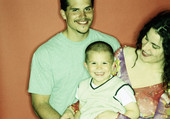
WEDNESDAY, May 19 (HealthDay News) — It’s been conventional thinking in the autism community for years: If you’re the parents of an autistic child, the stress is so overwhelming that you’ll supposedly face an 80 percent chance of getting divorced.
But a new study says that’s not true. In fact, parents of autistic children are no more likely to split up than any other parents.
“Our hope is to get this information out to families so they can feel a greater sense of hopefulness about their own family relations when they find out they have a child with autism,” said Brian Freedman, an autism researcher and the study’s lead author.
The U.S. Centers for Disease Control and Prevention estimates that one in 110 children has autism, about 80 percent of them boys.
Autism rates have been on the rise for years. However, it’s not clear if that’s because the condition is actually affecting more children or because autism is becoming better known to the people who make diagnoses.
Freedman said he’s talked to numerous families who have heard of the 80 percent divorce rate figure. “It’s almost as if they get a diagnosis of autism and then almost immediately a diagnosis of divorce,” he said. “That’s pretty troubling for them.”
Geraldine Dawson, chief science officer of the advocacy organization Autism Speaks, said that she, too, has heard the 80 percent statistic, which “had been part of the clinical lore.”
Families with autistic children do suffer high levels of stress, she said, even when compared with families with kids who have other kinds of chronic conditions.
But is the 80 percent number accurate? Freedman, who said he wasn’t able to find a source for the statistic, worked with colleagues to find out whether there’s any truth to it.
The researchers mined data from a 2007 national survey that included information on 77,911 American children, ages 3 to 17.
The researchers found that children with autism disorders had virtually the same likelihood of living with two married parents. About 64 percent of them did, compared with 65 percent of kids who weren’t autistic.
The study findings were to be presented Wednesday at the International Meeting for Autism Research, in Philadelphia.
“The families are resilient, and they’re able to find ways and find resources within themselves to stay together, much more than was previously thought,” said Freedman, who’s clinical director of the Center for Autism and Related Disorders at the Kennedy Krieger Institute in Baltimore.
Dawson said the strain on families with an autistic child can be tremendous as they deal with behavioral problems such as aggression, irritability and tantrums. There can be major financial strains, too, as some families have trouble getting proper care for their children.
But the study’s findings, she said, suggest that “in spite of all that, families are staying intact, and marriages are not falling apart.”
More information
The U.S. National Institute of Child Health and Human Development has more on autism spectrum disorders.

